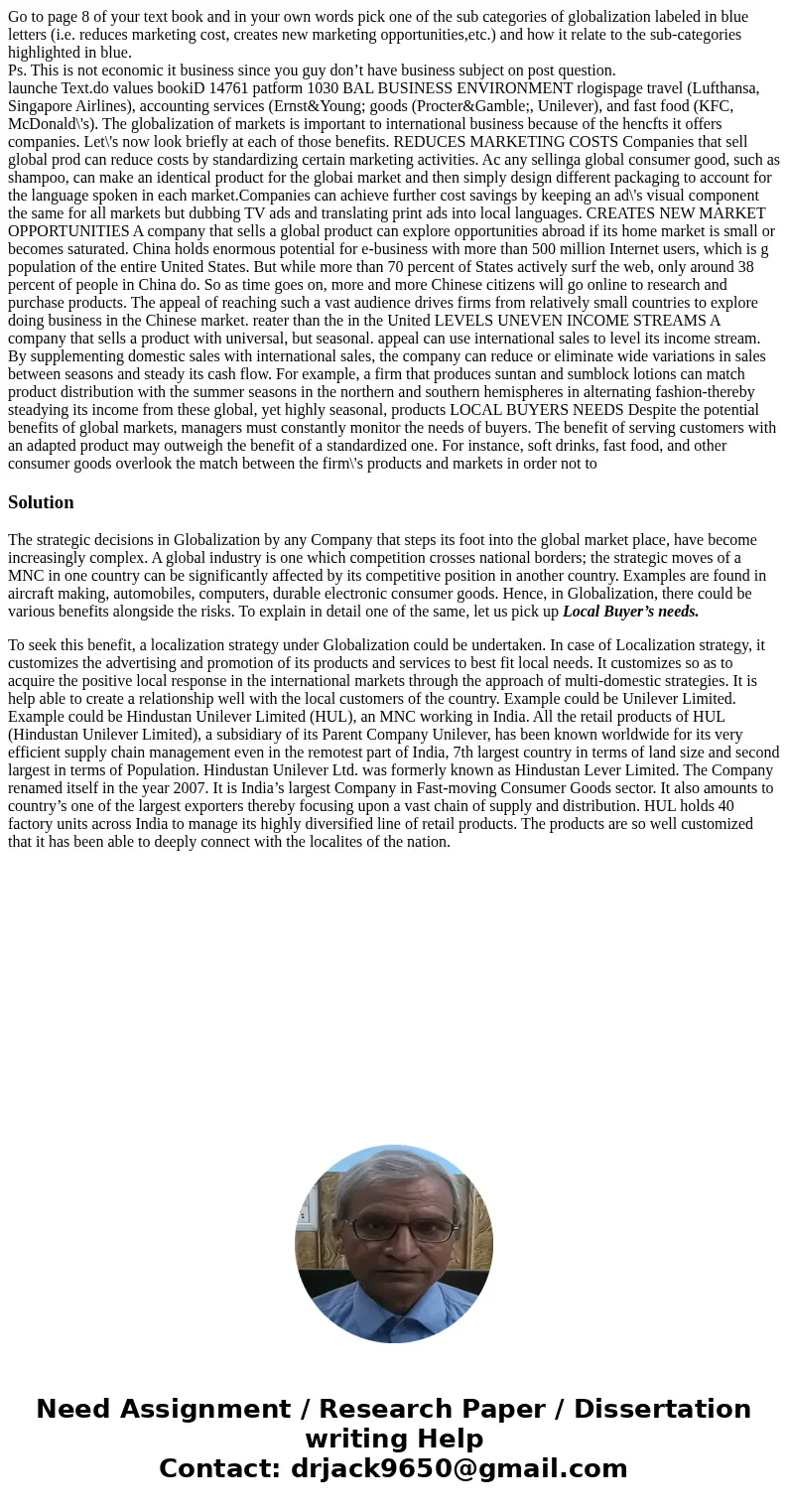Go to page 8 of your text book and in your own words pick one of the sub categories of globalization labeled in blue letters (i.e. reduces marketing cost, creates new marketing opportunities,etc.) and how it relate to the sub-categories highlighted in blue.
Ps. This is not economic it business since you guy don’t have business subject on post question.
launche Text.do values bookiD 14761 patform 1030 BAL BUSINESS ENVIRONMENT rlogispage travel (Lufthansa, Singapore Airlines), accounting services (Ernst&Young; goods (Procter&Gamble;, Unilever), and fast food (KFC, McDonald\'s). The globalization of markets is important to international business because of the hencfts it offers companies. Let\'s now look briefly at each of those benefits. REDUCES MARKETING COSTS Companies that sell global prod can reduce costs by standardizing certain marketing activities. Ac any sellinga global consumer good, such as shampoo, can make an identical product for the globai market and then simply design different packaging to account for the language spoken in each market.Companies can achieve further cost savings by keeping an ad\'s visual component the same for all markets but dubbing TV ads and translating print ads into local languages. CREATES NEW MARKET OPPORTUNITIES A company that sells a global product can explore opportunities abroad if its home market is small or becomes saturated. China holds enormous potential for e-business with more than 500 million Internet users, which is g population of the entire United States. But while more than 70 percent of States actively surf the web, only around 38 percent of people in China do. So as time goes on, more and more Chinese citizens will go online to research and purchase products. The appeal of reaching such a vast audience drives firms from relatively small countries to explore doing business in the Chinese market. reater than the in the United LEVELS UNEVEN INCOME STREAMS A company that sells a product with universal, but seasonal. appeal can use international sales to level its income stream. By supplementing domestic sales with international sales, the company can reduce or eliminate wide variations in sales between seasons and steady its cash flow. For example, a firm that produces suntan and sumblock lotions can match product distribution with the summer seasons in the northern and southern hemispheres in alternating fashion-thereby steadying its income from these global, yet highly seasonal, products LOCAL BUYERS NEEDS Despite the potential benefits of global markets, managers must constantly monitor the needs of buyers. The benefit of serving customers with an adapted product may outweigh the benefit of a standardized one. For instance, soft drinks, fast food, and other consumer goods overlook the match between the firm\'s products and markets in order not to
The strategic decisions in Globalization by any Company that steps its foot into the global market place, have become increasingly complex. A global industry is one which competition crosses national borders; the strategic moves of a MNC in one country can be significantly affected by its competitive position in another country. Examples are found in aircraft making, automobiles, computers, durable electronic consumer goods. Hence, in Globalization, there could be various benefits alongside the risks. To explain in detail one of the same, let us pick up Local Buyer’s needs.
To seek this benefit, a localization strategy under Globalization could be undertaken. In case of Localization strategy, it customizes the advertising and promotion of its products and services to best fit local needs. It customizes so as to acquire the positive local response in the international markets through the approach of multi-domestic strategies. It is help able to create a relationship well with the local customers of the country. Example could be Unilever Limited. Example could be Hindustan Unilever Limited (HUL), an MNC working in India. All the retail products of HUL (Hindustan Unilever Limited), a subsidiary of its Parent Company Unilever, has been known worldwide for its very efficient supply chain management even in the remotest part of India, 7th largest country in terms of land size and second largest in terms of Population. Hindustan Unilever Ltd. was formerly known as Hindustan Lever Limited. The Company renamed itself in the year 2007. It is India’s largest Company in Fast-moving Consumer Goods sector. It also amounts to country’s one of the largest exporters thereby focusing upon a vast chain of supply and distribution. HUL holds 40 factory units across India to manage its highly diversified line of retail products. The products are so well customized that it has been able to deeply connect with the localites of the nation.

 Homework Sourse
Homework Sourse